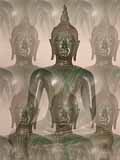
Practicing the perfection of giving -
According to Buddhism, there are three kinds of giving:
A) To help or benefit others by giving them the things they need. Food, clothing,
shelter, vehicles, money, and many other items of a material nature are included
in this category.
B) To help or benefit others by giving them right knowledge and correct view.
In Buddhism the reference is especially to Dharma, i.e., the Buddha's teachings,
be- cause according to Buddhism, Dharma is the most important knowledge that
can help people to rid themselves of
suffering. Broadly speaking, the teaching of proper knowledge and skill to peo-
ple to enable them to be productive members of society is also giving under
this category.
C) To help or benefit others by protecting them from various kinds of danger
or alleviating their fears. This is called the giving of fearlessness. People
who contribute to keeping a place, say, Central Park in New York City, secure
and peaceful day and night for the citizens are, indeed, giving in this category.
To save people from a ship in distress or from places hit by earthquakes, hurricanes,
tidal waves, or other disasters, are good examples of this kind of giving. A
good doctor or nurse who comforts a patient who has great fear is doing meritorious
giving.
....All of the above is giving, but it may not be the perfection of giving.
You may remember that when we talked about karma, I said at one point that one
who does good deeds with selfish motive receives limited merit, while one who
does the same good deeds with no specific purpose or desire, receive infinitely
greater merit. Let me now describe the perfection of giving, which is one of
the six Paramitas or perfections, taught by Buddha. Perfec- tion of giving means
giving without duality, without discrimination, and without concept of self.
Or, to put it anoth- er way, perfection of giving is giving without any idea
as to who is the recipient, what is being given, or who the donor is. Therefore,
giving conditionally, or with 'strings' attached, is a kind of giving but it
is not the perfection of giving. Giving with an expectation of reward is giving,
but not the perfection of giving. Giving with discrimination regarding the recipients,
such as, 'I only donate to the church but not to the school,' is giving, but
not the perfec- tion of giving. Giving for selfish reasons is giving; but it
is not the perfection of giving. The perfection of giving demands a mind of
equality, non duality, nondiscrimination, and no self. Such giving is therefore
in harmony with Original Nature. For those who have not achieved the ability
to be in harmony with Original Nature, intensive prayer to a more tangible supramundane
authority, such as the gods of different religions - Holy Mother Mary, Jesus
Christ, and in Buddhism, Buddha Amitabha and Bodhisattva Khan Yin the two most
popular names, all serve effective purposes when one is seriously ill, in danger,
desperate, approaching death, and so forth. Such prayer, particularly for those
who have had faith in one or more of the foregoing in their lives, could quickly
bring back their concentration. The unwavering tranquility of one's mind is
itself a process in harmony with Original Nature - the source of joy. I thank
you for your patience in listening so intently during these sessions. You have
probably noted that the key expression in these lectures has been Original Nature.
It may be helpful to offer you, as my conclusion, the following quotation from
Chapter 9 of The Holy teaching of Vimalakirti, by Dr. Robert A.F. Thurman, entitled,
"The Dharma-Door of Nonduality": Then, the Licchavi Vimalakirti asked
those Bodhisattvas, "Good Sirs, please explain how the Bodhisattvas enter
the Dharma-door of nonduality!" Thereupon, thirty-one Bodhisattvas expressed
their views of nonduality. I quote three expressions as examples: The Bodhisattva
Srigandha declared, "I' and 'mine' are two. If there is no presumption
of a self, there will be no possessiveness. Thus the absence of presumption
is the entrance into nonduality." The Bodhisattva Tisya declared, "'Good'
and 'evil' are two. Seeking neither good nor evil, the understanding of the
nonduality of the significant and the meaningless is the entrance into non duality."
The Bodhisattva Suddhadhimukti declared, "To say, 'This is happiness,'
and 'That is misery' is dualism. One
who is free of all calculations, through the extreme purity of gnosis - his
mind is aloof, like empty space; and thus he enters into nonduality." Near
the end we read: When the Bodhisattvas had given their explanations, they all
addressed the crown prince Manjushri: "Manjushri, what is the Bodhisattva's
en- trance into nonduality?" Manjushri replied, "Good sirs, you have
all spoken well. Nevertheless, all your explan- ations are themselves dualistic.
To know no one teaching, to express nothing, to say nothing, to explain nothing,
to announce nothing, to indicate nothing, and to designate nothing - that is
the entrance into nonduality." Then the crown prince Manjushri said to
the Licchavi Vimalakirti, "We have all given our own teachings, noble sir.
Now, may you elucidate the teaching of the entrance into the principle of nonduality!"
Thereupon, the Licchavi Vimalakirti kept his silence, saying nothing at all.
The crown prince Manjushri applauded the Licchavi Vimala- kirti: "Excellent!
Excellent, noble sir! This is indeed the entrance into the nonduality of the
Bodhisattvas. Here there is no use for syllables, sounds, and ideas."
Dr. C. T. Shen